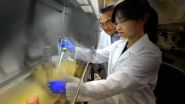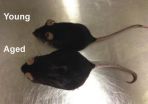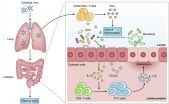INFORMATION:
This work was supported by a grant from the National Institutes of Health awarded to Dr. Croyle (U01 AI078045).
The 2014 AAPS Annual Meeting and Exposition aims to improve global health through advances in pharmaceutical sciences, and there will be over 470 exhibiting companies and an estimated 7,000 attendees. The meeting features nearly 245 programming sessions, including more than 65 symposia and roundtables and more than 2190 posters. Download the AAPS mobile application for additional information.
Editor's Note: All press must provide press credentials to attend this meeting and register on-site in the press room 5AB. To schedule an interview with Ms. Jonsson-Schmunk or for any other press inquiry, please contact Amanda Johnson at ajohnson@spectrumscience.com or 202-587-2520 or Saara Khadir at skhadir@spectrumscience.com or 202-587-2519. For the most up-to-date program information, please click here.
The American Association of Pharmaceutical Scientists is a professional, scientific society of approximately 10,000 members employed in academia, industry, government and other research institutes worldwide. Founded in 1986, AAPS provides a dynamic international forum for the exchange of knowledge among scientists to serve the public and enhance their contributions to health. AAPS offers timely scientific programs, on-going education, information resources, opportunities for networking, and professional development. For more information, please visit http://www.aaps.org. Follow us on Twitter @AAPSComms; official Twitter hashtag for the meeting is: #AAPS2014.
Nasal spray vaccine has potential for long-lasting protection from ebola virus
Pioneering research to be featured at 2014 AAPS Annual Meeting and Exposition
2014-11-03
(Press-News.org) San Diego — A nasal vaccine in development by researchers at The University of Texas at Austin has been shown to provide long-term protection for non-human primates against the deadly Ebola virus. Results from a small pre-clinical study represent the only proof to date that a single dose of a non-injectable vaccine platform for Ebola is long-lasting, which could have significant global implications in controlling future outbreaks. This work is being presented Nov. 5 at the 2014 American Association of Pharmaceutical Scientists (AAPS) Annual Meeting and Exposition, the world's largest pharmaceutical sciences meeting, in San Diego, Nov. 2-6.
The Ebola virus is an often fatal illness that is spread among the human population via direct contact with blood or bodily fluids from an infected individual. The current Ebola outbreak in Western Africa is the largest and most complex epidemic since the virus was first discovered in 1976, according to the World Health Organization. With a fatality rate currently as high as 70%, officials are declaring this outbreak a public health emergency of international concern.
Maria Croyle, a professor in the College of Pharmacy at The University of Texas at Austin, Kristina Jonsson-Schmunk, a graduate student in pharmacy, and colleagues at the university developed a nasal formulation that improved survival of immunized non-human primates from 67 percent (2 out of 3) to 100 percent (3 out of 3) after challenge with 1,000 plaque forming units of Ebola Zaire 150 days after immunization. This is important since only 50 percent of the primates given the vaccine by the standard route (intramuscular injection) survived challenge.
"Ebola causes devastating outbreaks with fatality rates of 25 - 90 percent in Africa and Asia. Although progress has been made in understanding the virus' biology, no licensed vaccines or treatments currently exist. There is a desperate need for a vaccine that not only prevents the continued transmission from person to person, but also aids in controlling future incidences," said Jonsson-Schmunk. "The main advantage of our vaccine platform over the others in clinical testing is the long-lasting protection after a single intranasal dose. This is important since the longevity of other vaccines for Ebola that are currently being evaluated is not fully understood. Moreover, the nasal spray immunization method is more attractive than a needle vaccine given the costs associated with syringe distribution and safety."
The next stage of Dr. Croyle's research is a Phase I clinical trial that tests the effectiveness of their vaccine in human subjects. They will also further explore preliminary data they have collected for administration of the vaccine as a thin film under the tongue in non-human primates.
ELSE PRESS RELEASES FROM THIS DATE:
Biological fat with a sugar attached essential to maintaining the brain's supply of stem cells
2014-11-03
AUGUSTA, Ga. – Fat and sugar aren't usually considered healthy staples, but scientists have found that a biological fat with a sugar attached is essential for maintaining the brain's store of stem cells.
Neural stem cells help the brain develop initially, then repopulate brain cells lost to usual cell turnover as well as to a trauma or malady, such as a head injury or stroke.
While the cell population and activity decrease as a natural part of aging, scientists at the Medical College of Georgia at Georgia Regents University are studying how neural stem cells ...
School environment affects teacher expectations of their students
2014-11-03
The school environment in which teachers work is related to their expectations of students, according to a new study by researchers at the University of Montreal. "It is known that low teacher expectations are negatively associated with student achievement and school effectiveness. While we know that expectations are primarily determined by the specific characteristics of teachers, we have shown that the school environment also plays a determining role," says lead author of the study, Marie-Christine Brault, a post-doctoral researcher at the university's Institut de recherche ...
Beliefs about the soul and afterlife that we acquire as children stick with us
2014-11-03
What we believed as children about the soul and the afterlife shapes what we believe as adults – regardless of what we say we believe now, according to a new Rutgers study.
"My starting point was, assuming that people have these automatic – that is, implicit or ingrained – beliefs about the soul and afterlife, how can we measure those implicit beliefs?," said Stephanie Anglin, a doctoral student in psychology in Rutgers' School of Arts and Sciences.
Her research, "On the Nature of Implicit Soul Beliefs: When the Past Weighs More Than the Present," ...
Women with bipolar disorder at 50 percent greater risk of delivering preterm babies
2014-11-03
TORONTO, ON, Nov. 3, 2014 — Women who have been previously hospitalized for bipolar disorder are nearly twice as likely to have premature babies compared to women without a history of mental illness, according to a new study by researchers at Women's College Hospital and the Institute for Clinical Evaluative Sciences (ICES).
The study, published today in the American Journal of Obstetrics and Gynecology, shows pregnant women with bipolar disorder are at greater risk of having premature babies and other serious complications. While the study did not examine the ...
Wrangling data flood to manage the health of streams
2014-11-03
Today's natural resource manager tending to the health of a stream in Louisiana needs to look upstream. Way upstream - like Montana. Michigan State University (MSU) scientists have invented a way to more easily manage the extensive nature of streams.
There are 2.6 million stream reaches in the contiguous United States that are intricately interconnected. It's impossible to address the health of one reach without knowing what's happening upstream.
Science, wielding geographic information systems, has obliged with data on geology, climate, pollution and land use. But ...
Obesity a liability in cancer immunotherapy
2014-11-03
Packing on the pounds may lead to dangerous inflammation in response to anti-cancer treatment, according to a study by William Murphy and colleages at UC Davis. The study, published in The Journal of Experimental Medicine, shows that overweight mice develop lethal inflammation in response to certain anti-cancer therapies, suggesting a possible link between body weight and adverse side effects in cancer patients treated with similar protocols.
Cancer treatment has been revolutionized by new approaches aimed at stimulating the body's own immune system to fight off tumor ...
On the throne with the flu
2014-11-03
Flu infection has long-ranging effects beyond the lung that can wreak havoc in the gut and cause a dreaded symptom, diarrhea, according to a study published in The Journal of Experimental Medicine.
Gastrointestinal symptoms are often seen with flu infection, but because the virus only grows in lung cells, it's unclear how intestinal symptoms develop. Researchers in China now show that flu infection in mice prompts responding immune cells in the lung to alter their homing receptors, causing them to migrate to the gut. Once there, they produce the antiviral mediator IFN-γ, ...
Immunotherapy for cancer toxic with obesity
2014-11-03
(SACRAMENTO, Calif.) — Immunotherapy that can be effective against tumors in young, thin mice can be lethal to obese ones, a new study by UC Davis researchers has found. The findings, published online today in The Journal of Experimental Medicine, suggest a possible link between body fat and the risk of toxicity from some types of immunotherapy.
The study comes at a time of great excitement about immunotherapy drugs, which are being developed and used increasingly against cancer, particularly in melanoma and kidney and prostate cancers.
Immunotherapies use immune ...
Western retailers in China boost Chinese manufacturing supremacy
2014-11-03
When western retailers like Walmart and Tesco move into China, Chinese manufacturing gets a boost, shows a new study by the University of British Columbia's Sauder School of Business.
"Many assume Western retailers act as gateways for western goods into Chinese markets, helping to resolve trade imbalances tipped in favour of China's powerhouse manufacturing sector," says lead author Keith Head, HSBC Professor in Asian Commerce at Sauder. "But it appears that multinational retailers are actually enhancing the export capabilities of Chinese suppliers."
After 1995, when ...
The effects of poor eating habits persist even after diet is improved
2014-11-03
Almost everyone knows that improving your eating habits will most likely improve your health. What most people may not know, however, is that the effects of poor eating habits persist long after dietary habits are improved. In a new report appearing in the November 2014 issue of the Journal of Leukocyte Biology, scientists use mice to show that even after successful treatment of atherosclerosis (including lowering of blood cholesterol and a change in dietary habits) the effects of an unhealthy lifestyle still affect the way the immune system functions. This change in function ...
LAST 30 PRESS RELEASES:
Increasing the number of coronary interventions in patients with acute myocardial infarction does not appear to reduce death rates
Tackling uplift resistance in tall infrastructures sustainably
Novel wireless origami-inspired smart cushioning device for safer logistics
Hidden genetic mismatch, which triples the risk of a life-threatening immune attack after cord blood transplantation
Physical function is a crucial predictor of survival after heart failure
Striking genomic architecture discovered in embryonic reproductive cells before they start developing into sperm and eggs
Screening improves early detection of colorectal cancer
New data on spontaneous coronary artery dissection (SCAD) – a common cause of heart attacks in younger women
How root growth is stimulated by nitrate: Researchers decipher signalling chain
Scientists reveal our best- and worst-case scenarios for a warming Antarctica
Cleaner fish show intelligence typical of mammals
AABNet and partners launch landmark guide on the conservation of African livestock genetic resources and sustainable breeding strategies
Produce hydrogen and oxygen simultaneously from a single atom! Achieve carbon neutrality with an 'All-in-one' single-atom water electrolysis catalyst
Sleep loss linked to higher atrial fibrillation risk in working-age adults
Visible light-driven deracemization of α-aryl ketones synergistically catalyzed by thiophenols and chiral phosphoric acid
Most AI bots lack basic safety disclosures, study finds
How competitive gaming on discord fosters social connections
CU Anschutz School of Medicine receives best ranking in NIH funding in 20 years
Mayo Clinic opens patient information office in Cayman Islands
Phonon lasers unlock ultrabroadband acoustic frequency combs
Babies with an increased likelihood of autism may struggle to settle into deep, restorative sleep, according to a new study from the University of East Anglia.
National Reactor Innovation Center opens Molten Salt Thermophysical Examination Capability at INL
International Progressive MS Alliance awards €6.9 million to three studies researching therapies to address common symptoms of progressive MS
Can your soil’s color predict its health?
Biochar nanomaterials could transform medicine, energy, and climate solutions
Turning waste into power: scientists convert discarded phone batteries and industrial lignin into high-performance sodium battery materials
PhD student maps mysterious upper atmosphere of Uranus for the first time
Idaho National Laboratory to accelerate nuclear energy deployment with NVIDIA AI through the Genesis Mission
Blood test could help guide treatment decisions in germ cell tumors
New ‘scimitar-crested’ Spinosaurus species discovered in the central Sahara
[Press-News.org] Nasal spray vaccine has potential for long-lasting protection from ebola virusPioneering research to be featured at 2014 AAPS Annual Meeting and Exposition




